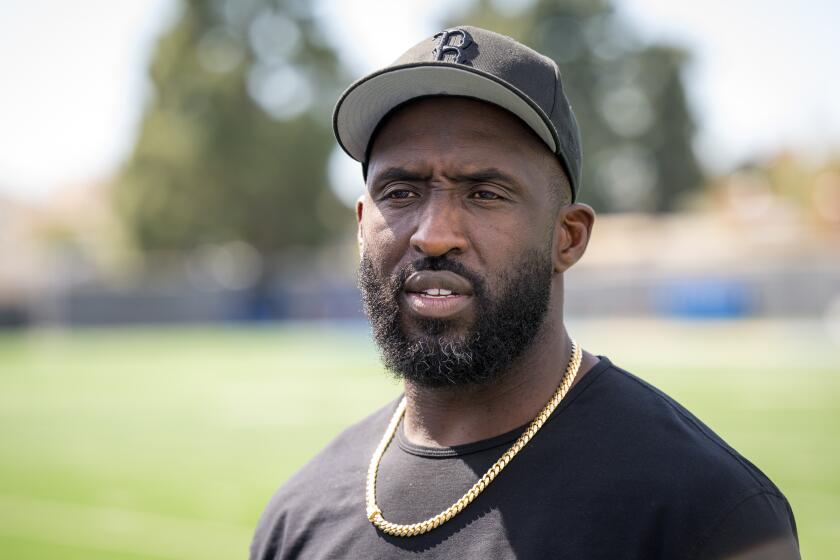Osborne Has a Few Words for Donahue
- Share via
A chagrined Coach Tom Osborne of Nebraska, whose team will play UCLA Saturday at the Rose Bowl, defended his program Tuesday against what he believed were negative inferences by UCLA Coach Terry Donahue.
In a telephone press conference Monday with Nebraska and local reporters, Donahue implied, without addressing the issue directly, that Nebraska players were on steroids when UCLA played the Cornhuskers in 1983 and 1984.
At least, that’s what Osborne read into the comments, which so perturbed him that he telephoned Donahue Tuesday morning.
“I personally don’t think we have any problem in that area,” Osborne said later in the day, addressing the issue of steroid use at his weekly meeting with reporters. “I’m not saying that nobody ever used (steroids). I don’t know. It’s possible.”
Since Nebraska started testing for drugs in 1983, two players have tested positive for steroid use, Osborne said. “Neither of those players ever started for us and neither ever played against UCLA,” he said.
However, former Nebraska guard Dean Steinkuhler, who won the Outland Trophy as the nation’s top lineman in 1983, later told reporters that he had used steroids while he played at Nebraska.
Nebraska beat UCLA in 1983, 42-10, and again in 1984, 42-3.
Donahue was quoted in Tuesday’s Omaha World-Herald as saying: “In my opinion, in 1983 and 1984, Nebraska was not a normal college football team. You can take that for what it’s worth and you can interpret that any way you want.
“They were the most unusual team, other than one other I’ve faced, in 13 years as a head coach. Their players were not typical college football players. Last year, they were.”
Donahue also was quoted as saying that he didn’t enjoy last season’s 42-33 loss to Nebraska, “but I felt it was a fair game.”
Asked if he believed that Nebraska used unethical means to gain a competitive edge in 1983 and 1984, Donahue told reporters: “I won’t comment on that. . . .
“They had unusually big, active, fast players. Their offensive line at that point was the biggest, most physical offensive line, with one exception, that I’ve seen.
“The point is, we had no way to match up. I’m not going to belabor the issue, but I’m not going to duck the issue. The issue is, in ’83 and ‘84, we were not competitive. . . . The disparity between the two teams was so great that we could have played Nebraska 50 times and the outcome wouldn’t have been any different. Last year, I didn’t feel like that.
“Those are my last words on it. I don’t want to go into it any further. I’m giving you a fair answer.”
Donahue said Tuesday that his comments were misinterpreted.
“At no time did I say a word about steroids,” he said. “If I wanted to charge steroid use, I would have charged steroid use.
“If I would have wanted to charge Nebraska with being on steroids, I would have said, ‘Those bastards were on steroids.’
“But (the implication of) steroids (use) came out of it because I think there’s a sensitivity there. . . . From what I understand, Nebraska is sensitive about this.”
Donahue again called Nebraska’s 1983 and 1984 teams “atypical” college football teams with “unusually big” offensive linemen.
“I was just trying to make a point that three or four times in my career I have felt like (we faced) unusual players,” he said. “Some of that’s recruiting, some of it’s weight programs, some of it’s training table. Some of it might be steroid use, if that’s what somebody wants to say. I didn’t say that.”
Does Donahue believe that steroids were used at Nebraska in 1983 and 1984?
“I have absolutely no idea,” he said. “I couldn’t tell you.”
Osborne said that, according to tests conducted by his coaching staff, Nebraska players are bigger, stronger and “probably more explosive” now than they were in 1983 and 1984.
“Our numbers in terms of strength and speed and vertical jump have gotten better than they were in ’83 and ‘84,” Osborne said.
Nebraska’s 1983 team, led by Heisman Trophy winner Mike Rozier, was 12-0 before losing in the Orange Bowl to Miami, 31-30, in a game that determined the national championship. The 1984 team lost to Syracuse, 17-9, a week after beating UCLA and wound up 10-2.
Thirteen players from those teams are still active in the National Football League, according to the Nebraska sports information office.
More to Read
Go beyond the scoreboard
Get the latest on L.A.'s teams in the daily Sports Report newsletter.
You may occasionally receive promotional content from the Los Angeles Times.






